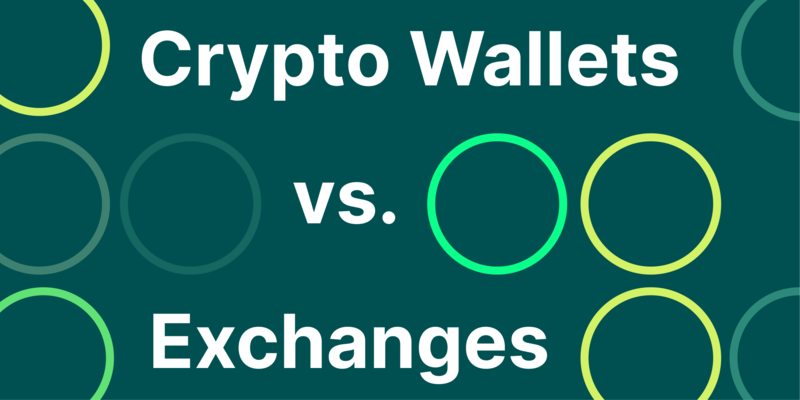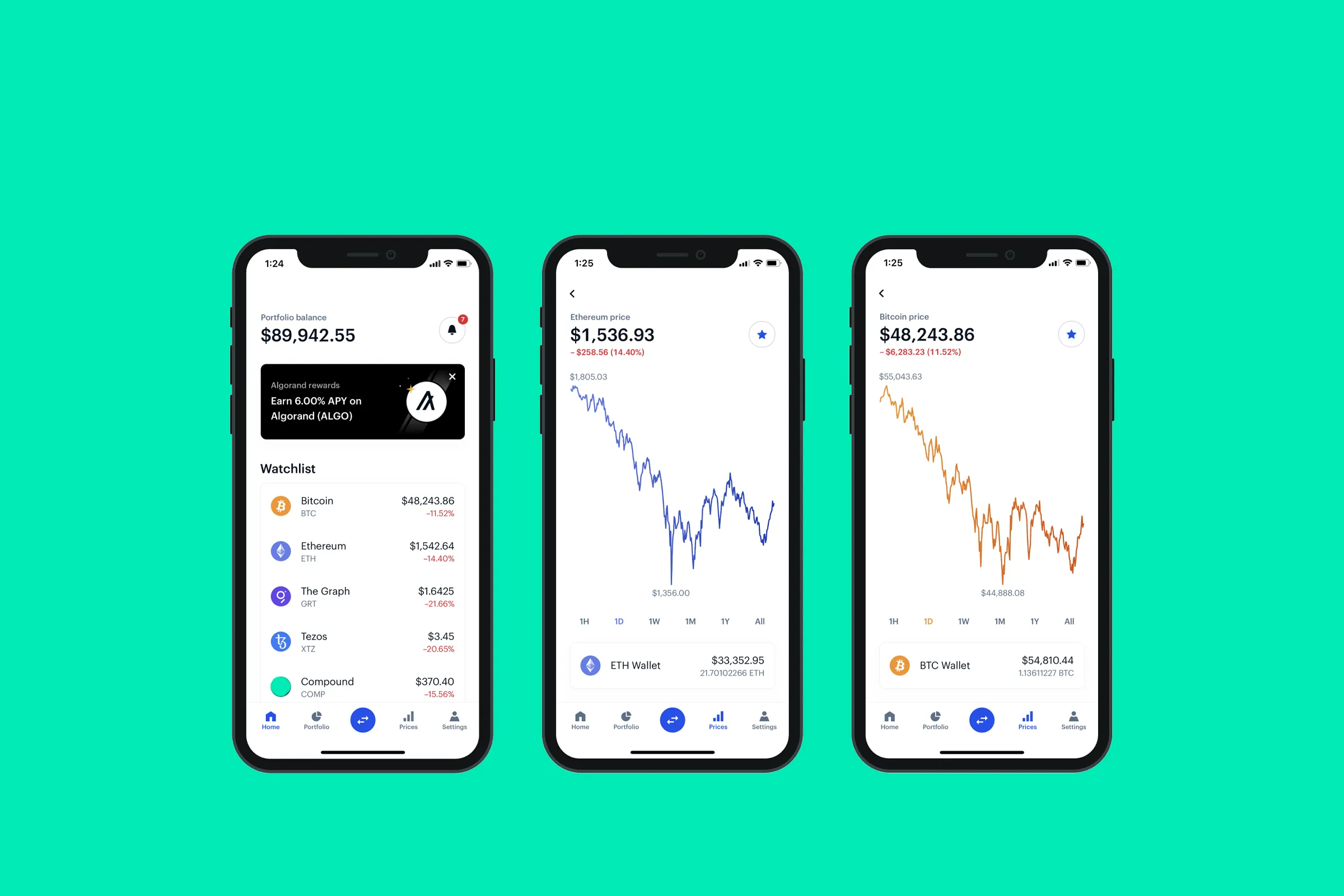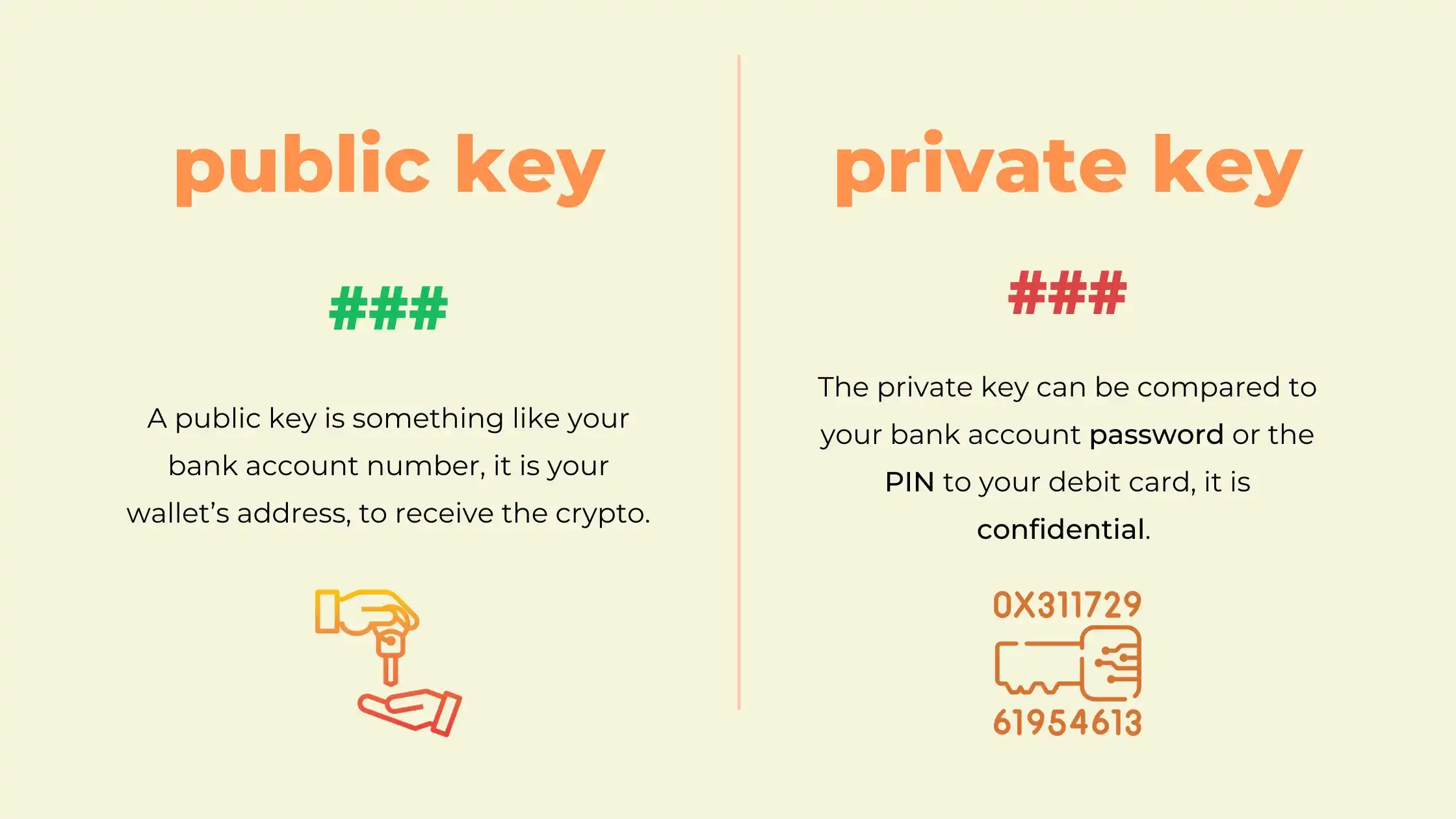If diving into this digital realm, you’ve likely encountered the terms crypto wallets and exchanges.
But what’s the difference, and which one should you use?
Drawing insights from trusted sources, this article aims to demystify these two critical elements of the crypto universe.
I will explore their unique features, security protocols, and the level of control they offer you over your assets.
Let’s dive in!
Crypto Exchanges vs Crypto Wallets
What is a Crypto Exchange?
A cryptocurrency exchange like Kraken is a digital market where you can buy or sell cryptocurrencies.
But unlike traditional stock exchanges, crypto exchanges operate 24/7, allowing you to trade anytime.
Now, you might be wondering, what types of crypto exchanges exist?
There are mainly three types: hybrid, centralized and decentralized exchanges.
Centralized exchanges, like Coinbase or Bybit, act as middlemen and have an interface where buyers and sellers meet.
They’re user-friendly but often require you to relinquish control of your private keys.
On the flip side, decentralized exchanges (DEXs) allow peer-to-peer trading without intermediaries.
DEXs offer increased privacy and control but can be less user-friendly and offer fewer trading options.
And then there are hybrid exchanges. These exchanges include the best of both worlds by combining features from centralized and decentralized platforms like StormGain.
What is a Crypto Wallet?
A cryptocurrency wallet is essentially a digital tool that allows crypto storage and to send and receive cryptocurrencies.
Think of it as your crypto bank account.
Unlike traditional bank accounts, most crypto wallets give you full control over your money, including the all-important private keys.
There are several cryptocurrency wallets:
- Hardware wallets
- Software wallets
- Mobile wallets
- Paper wallets.
Hardware wallets are classified as cold wallets and are small devices that store your crypto offline, offering an extra layer of physical security as they are not connected to the internet.
Software wallets are classified as hot wallets and are applications you can download on your computer or mobile device. They’re convenient but generally less secure than hardware wallets.
A paper wallet holds the private keys for your particular wallet.
As the name suggests, you store the private keys to your crypto on paper and keep it somewhere safe to minimize the risk of losing it.
Ownership and Control
So, do you want to understand if keeping your crypto in a wallet or exchange is safer?
This is where things get interesting.
Let’s start with crypto exchanges.
When you use a centralized exchange, you entrust them with your assets.
These are known as custodial services.
But because you are keeping crypto on an exchange, they also control your private keys.
This means you’re relying on the security measures centralized exchanges provide to keep your crypto assets safe.
Now, what about crypto wallets?
This is where the term “non-custodial” comes into play.
They are also called self-custody wallets.
Most crypto wallets are non-custodial, meaning you have full control over your private and public keys and, by extension, your assets.
Storing crypto in a non-custodial wallet means greater security and privacy. It also comes with the responsibility of safeguarding your private keys.
Lose them; you could lose all the crypto in a non-custodial crypto wallet forever.
But what if you want a middle ground?
Some wallet options offer a custodial service where they hold your private keys for you.
This can be convenient and somewhat more secure if you’re not tech-savvy, but it also means you’re giving up some control. To know further, you can read this guide on custodial vs non-custodial wallets.
Security Measures
Many exchanges provide a range of security protocols to make holding crypto feel safer.
We’re talking
- Two-factor authentication (2FA)
- Cold storage
- Insurance policies
But even with these measures, exchanges are still online platforms, making them susceptible to crypto hacks and security breaches.
Now, let’s shift gears to different types of wallets and the pros and cons of storing any cryptocurrency.
The security of using a crypto wallet largely depends on its type and how you use it.
Hardware wallets, for instance, keep your crypto safe by storing your cryptocurrency offline.
While convenient, software, mobile, desktop wallets, and web wallets are as secure as their installed device.
If your computer or phone gets infected with malware, your digital asset could be at risk.
And what about user responsibility?
This is crucial in crypto, especially for non-custodial wallets where you control your private keys.
Lose your keys or fail to back them up; you could lose your crypto without any hope of getting it back.
Your public key is safe to share, which you should share as your wallet address when sending and receiving crypto.
Conversely, forgetting your login credentials for an exchange could be less catastrophic, as customer support can often help you regain access.
Accessibility and Usability
Starting with exchanges, they are used for storing different types of crypto and are designed to be user-friendly.
They offer intuitive interfaces, easy navigation, and quick access to various trading options.
Many exchanges also offer mobile apps, making trading crypto on the go easy.
Now, let’s talk about wallets.
The usability of crypto wallets vs. exchanges can vary significantly depending on their type.
Hardware wallets are small devices that, while secure, can be a bit cumbersome to set up and use for sending crypto and storing crypto, especially for crypto newbies.
Conversely, software and mobile wallets are generally easier to navigate but may lack some advanced features in hardware wallets.
But what about accessibility across devices?
This is where software and mobile wallets shine.
They allow you to access your assets from multiple devices, provided you have the necessary security credentials.
Exchanges offer this multi-device accessibility as well, often syncing your account across desktop and mobile platforms.
Transaction Speed and Costs
Now that we’ve covered a fair number of things let’s talk about something that’s often overlooked but incredibly important: transaction speed and costs.
First up, crypto exchanges.
Exchanges are a market for buyers and sellers and are generally quick regarding crypto trading.
It might sound great, but here’s the chaser: This speed often comes at a cost.
Exchanges charge trading fees, which can be a percentage of the trade or a flat fee.
And don’t forget about withdrawal fees, as exchanges provide wallet services, which can add up if you move your assets frequently.
Now, let’s shift our focus to wallets.
The speed of a transaction in a wallet largely depends on the network you’re using and the associated fees cryptocurrency investors are willing to pay.
But wait, there’s more.
While the transaction fees for sending assets from a wallet are generally cost-effective, it can be slower, especially if the network is congested.
And if you’re using a hardware wallet, you’ll need to connect it to a computer to buy and sell crypto, adding an extra step to the process.
What about transaction costs in wallets?
These are usually network fees paid to miners or validators on the blockchain.
The good news is that these fees often go directly to supporting the network rather than to a third party like an exchange.
Flexibility and Functionality
Alright, you’re well-versed in the basics, but what about each option’s range of services and features?
Let’s dig in.
These platforms offer many services beyond just buying and selling, starting with crypto exchanges.
We’re talking
- Staking
- Lending
- Futures trading
- Initial Coin Offerings (ICOs).
Sounds like a one-stop shop, right?
But wait, there’s more.
Whichever you pick will also offer educational resources, market analysis tools, and social trading features to enhance your trading experience.
Now, let’s pivot to wallets.
A crypto wallet generally focuses on doing one thing well: storing your assets securely.
But don’t underestimate them.
Modern wallets can offer additional features like swapping between different cryptocurrencies directly within the wallet or even staking certain assets to earn rewards.
However, they generally don’t offer the wide range of trading options and financial products that exchanges do.
What about multi-currency support?
This is where both exchanges and wallets have made significant strides.
Many exchanges now support many cryptocurrencies, not just Bitcoin and Ethereum.
Wallets have followed suit, with many offering support for multiple blockchains and tokens.
Regulatory Compliance
So, you’re getting a good grasp of the features and functionalities, but what about the legal landscape?
Let’s dive into the world of regulatory compliance.
Starting with crypto exchanges, these platforms are often subject to regulatory oversight.
This means they must comply with laws such as
- Anti-Money Laundering (AML)
- Know Your Customer (KYC) requirements.
This regulatory compliance often means that exchanges require you to provide personal identification documents, which could be a concern if you’re keen on maintaining your privacy.
The exchanges hold on to these documents and will hand them over to authorities if there are fishy happenings in your account.
Now, what about crypto wallets?
Wallets generally fall outside the scope of regulatory oversight.
Why?
Because most are non-custodial, meaning they don’t hold your assets for you.
This gives you more privacy and control but also means you’re solely responsible for the security of your assets.
But here’s something to consider.
Some wallets that offer custodial services may be subject to similar regulations as exchanges, especially if they offer additional financial services like staking or lending.
Privacy Concerns
You’ve got the scoop on everything from functionality to legalities, but what about privacy?
Starting with crypto exchanges, your identification documents are stored on their servers, making them potentially vulnerable to data breaches and hacks.
Now, let’s shift our focus to crypto wallets.
Most wallets, especially non-custodial ones, don’t require revealing your identity.
This offers a higher level of privacy, allowing you to transact somewhat anonymously.
While you may not need to provide personal information, your transactions are still recorded on the blockchain, which is publicly accessible.
What about custodial wallets?
These are a different beast.
Like exchanges, they may require KYC checks, especially if they offer additional services like staking or lending.
This means you’ll need to compromise on privacy to some extent if you opt for a custodial wallet.
Who Should Use What?
So, you’ve got a wealth of information on exchanges and wallets, from security measures to privacy concerns.
But the million-dollar question remains: who should use what?
If you’re a frequent trader who values a wide range of services and quick transactions and doesn’t mind undergoing KYC checks, create an account on an exchange.
Between a wallet and an exchange, you should select an exchange if you are a beginner still getting your feet wet in the crypto world, thanks to their user-friendly interfaces and educational resources.
Now, what about crypto wallets?
If you prioritize security and privacy above all else, creating a wallet, particularly a non-custodial one, could be your go-to option.
But that’s not all.
Wallets are also ideal for long-term investors, or “HODLers,” who don’t need to trade their assets frequently and want to keep them in a secure environment.
And what if you’re somewhere in between?
You might benefit from using both.
Many people use exchanges for trading, receive funds there, and then transfer their assets to a wallet for safekeeping.
This approach gives you the best of both worlds: an exchange’s convenience and functionality coupled with a wallet’s security and control.
Recommended Read: What to do if your crypto exchange account gets hacked?
Conclusion
Many people, including myself, find value in using both crypto wallets and crypto exchanges.
I use exchanges for quick trades and market analysis, then transfer my assets to a secure wallet for long-term storage.
This hybrid approach offers a balanced mix of convenience and security, allowing you to capitalize on the unique benefits of each.
In the end, the choice is yours to make.
Consider your individual needs, your level of technical expertise, and how you plan to interact with the crypto ecosystem.
Wallets and exchanges are two components of the crypto world.
There’s no one-size-fits-all solution, but you can make an informed decision with the information you’ve gathered today.
Happy trading or holding—whichever you choose!




